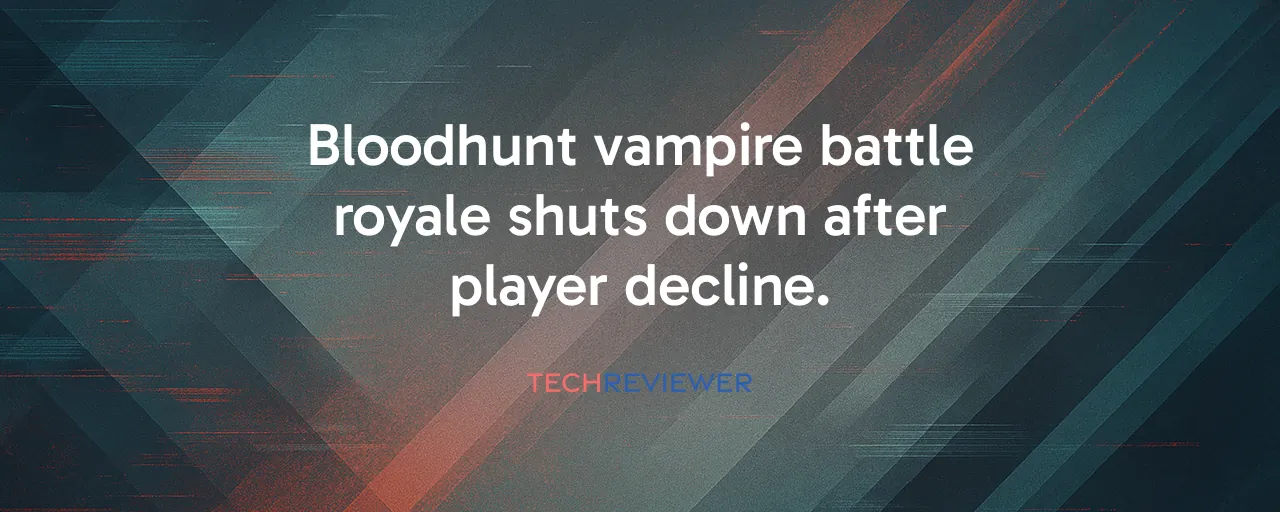A Vampire's Last Stand in Prague
Vampire: The Masquerade - Bloodhunt, a battle royale where players scaled Prague's gothic rooftops as supernatural predators, will vanish on April 28, 2026. Sharkmob, the Swedish studio behind the game, announced the server shutdown after a steep decline in players, with only 246 to 449 daily users on Steam by October 2025 compared to a peak of 29,475 at launch in April 2022. The game's blend of vertical combat and vampire lore initially drew a crowd, but it couldn't hold them. For the small but dedicated community still prowling Prague's alleys, the news hit hard, marking the end of a unique experiment in a crowded genre.
The shutdown isn't just a loss for players who poured hours into mastering Nosferatu stealth or Brujah brawling. It's a stark reminder of how fragile live service games can be. Sharkmob's decision, driven by unsustainable server costs and a dwindling player base, reflects broader challenges in a market where only giants like Fortnite and Apex Legends seem to thrive. The game's closure raises tough questions about what happens when digital worlds players invest in disappear forever.
Why Bloodhunt Couldn't Sink Its Fangs Deep Enough
Bloodhunt launched in early access in 2021 and fully released in April 2022, blending the Vampire: The Masquerade universe with battle royale chaos. Its vertical gameplay, letting players leap across Prague's spires, and clan-based abilities, like Toreador's swift dashes, set it apart. Yet, within two months, it lost 90 percent of its players. Technical hiccups didn't help, crashes on PlayStation 5, a notorious reload bug, and spotty matchmaking frustrated players early on. By October 2024, fewer than 1,000 players logged in daily, a far cry from the 29,475 at its peak.
The battle royale market was unforgiving. From 2021 to 2024, the genre's playtime dropped 37 percent, per Newzoo, as players flocked to established titles. Fortnite alone gobbled up 77 percent of the genre's attention by 2024. Bloodhunt's niche vampire theme, while evocative, didn't have the mainstream pull to compete. Limited content updates and a small studio stretched thin couldn't match the relentless pace of bigger rivals. Sharkmob's pivot to Exoborne, an extraction shooter, shows they're learning from the market's brutal realities.
Lessons From Bloodhunt and Anthem's Collapses
Bloodhunt's fall echoes other live service flops, like BioWare's Anthem. Launched in 2019, Anthem promised a rich sci-fi world but stumbled with technical issues and thin content, losing most players within months. By 2026, EA confirmed its shutdown, leaving fans with nothing but memories. Both games suffered from launching into oversaturated markets without enough unique pull to retain players. Anthem's big-budget backing couldn't save it, just as Bloodhunt's vampire flair couldn't overcome genre fatigue.
Knockout City, another casualty, shows a different angle. EA's dodgeball-inspired title surged during the pandemic but fizzled as player habits shifted post-2022, shutting down after two years. Unlike Bloodhunt, it leaned on quirky fun but still couldn't sustain the player base needed for server costs. These cases highlight a brutal truth: live service games need massive, consistent crowds to survive. Small studios like Sharkmob face steeper odds when pitted against industry titans with deeper pockets and broader reach.
Players Left in the Dark
For Bloodhunt's remaining players, the shutdown means losing everything, cosmetic skins, battle pass rewards, and hours spent building vampiric personas. Unlike single-player games, where discs or files can be revisited, online-only titles like Bloodhunt vanish when servers go offline. No refunds or compensation will come for those who spent money, a sore point echoed in Ubisoft's The Crew shutdown, which sparked lawsuits over lost purchases. The six-month notice gives players time to savor Prague's streets, but after April 2026, it's gone for good.
This loss fuels a growing push for game preservation. The Stop Killing Games movement argues publishers should offer offline modes or community server tools when titles shut down. Only 5 percent of online-only games get such patches, leaving most as digital ghosts. Bloodhunt's complex Vampire: The Masquerade IP licensing, controlled by Paradox Interactive, makes fan-run servers unlikely. Players feel betrayed, but developers face tough economics, keeping servers alive for a few hundred users isn't viable.
What's Next for Gaming's Live Service Dreams
Bloodhunt's end signals a shift in gaming's live service landscape. Publishers like Sony, which backed Bloodhunt as a PS5 exclusive, are scaling back, cutting planned live service titles from 12 to 6 by 2025. The market's consolidating around proven winners, leaving little room for new blood. Sharkmob's move to Exoborne suggests they're chasing the next hot genre, extraction shooters, but it's a risky bet in a market wary of unproven ventures.
The bigger lesson is about sustainability. Live service games need more than a cool concept, they demand constant content, flawless tech, and a massive audience. Research shows social features, like guilds or team challenges, boost retention by fostering community, something Bloodhunt lacked. As players and developers navigate this reality, the industry may lean toward hybrid models blending single-player depth with optional multiplayer. For now, Bloodhunt's players will hold onto memories of Prague's rooftops, a fleeting dream in gaming's high-stakes world.
